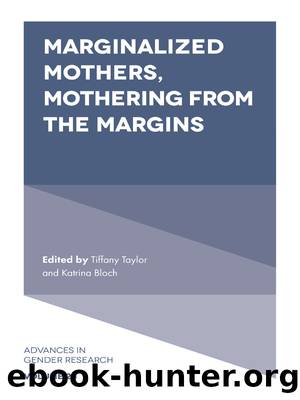Marginalized Mothers, Mothering from the Margins by Taylor Tiffany;Bloch Katrina;

Author:Taylor, Tiffany;Bloch, Katrina;
Language: eng
Format: epub
Publisher: Emerald Publishing Limited
Published: 2018-09-25T00:00:00+00:00
REFERENCES
Aranda, E. (2003). Global care work and gendered constraints: The case of Puerto Rican transmigrants. Gender & Society, 17, 609â626.
Basch, L., Schiller, N. G., & Blanc, C. (1994). Nations unbound: Transnational projects, post-colonial predicaments and deterritorialized nation-states. New York, NY: Gordon and Breach.
Brenner, J., & Laslett, B. (1991). Gender, social reproduction and womenâs self organizations: Considering the U.S. welfare state. Gender & Society, 5, 311â333.
Brown, I. (2010). Ambivalence of the motherhood experience. In A. OâReilly (Ed.), 21st century motherhood: Experience, identity, policy, agency (pp. 121â139). New York, NY: Columbia University Press.
Chang, G., Forcey, L.R., & Glenn, E. N. (1994) Mothering: ideology, experience, and agency. New York: Routledge.
Chang, G. (2000). Disposable domestics: Immigrant women workers in the global economy. Cambridge, MA: South End.
Chavez, L. (1998). Shadowed lives: Undocumented immigrants in American society. New York, NY: Harcourt Brace College.
Collins, P. H. (1994). Shifting the center: Race, class and feminist theorizing about motherhood. In E. Nakano Glenn, G. Chang, & L. R. Forcey, Mothering: Ideology, experience and agency (pp. 45â91). New York, NY: Routledge.
Conseil National des Droits de lâHomme (National Council of Human Rights). (2013). Foreigners and human rights in Morocco for a radically new asylum and migration policy. Executive summary. Rabat, Morocco: CNDH.
de Haas, H. (2014). Morocco: Setting the stage for becoming a migration transition country? Retrieved from https://www.migrationpolicy.org/article/morocco-setting-stage-becoming-migration-transition-country
Dreby, J. (2006). Honor and virtue Mexican parenting in the transnational context. Gender & Society, 20, 32â59.
Dreby, J. (2007). Children and power in Mexican transnational families. Marriage and Family, 69, 1050â1064.
Dreby, J., & Adkins, T. (2011). The strength of family ties: How US migration shapes childrenâs ideas of family. Childhood, 19, 169â187.
Düvell, F. (2012). Transit migration: A blurred and politicised concept. Population, Space and Place, 18, 415â427.
Glenn, E. N. (1992). From servitude to service work: The historical continuities of womenâs paid and unpaid reproductive labor. Journal of Women in Culture and Society, 18, 1â44.
Groupe Antiraciste dâAccompagnement et de Défense des étrangers et Migrants (GADEM). (2013). Report on Moroccoâs implementation of the international convention on the protection of the rights of all migrant workers and members of their families. Executive summary, 18th Session, April 15â26.
Herrera, G. (2013). Gender and international migration: Contributions and cross-fertilizations. Annual Review of Sociology, 39, 471â489.
Hochschild, R. A., Lise W. I., & Sambasivan Y. D. (2008). Global care crisis. American Behavioral Scientists, 52, 405â425.
Hondagneu-Sotelo, P. (2013). New directions in gender and immigration research. In S. J. Gold S. Nawyn (Eds.), The Routledge international handbook of migration studies (pp. 180â188). London: Routledge.
Hondagneu-Sotelo, P., & Avila, E. (1997). âIâm here, but Iâm thereâ the meanings of Latina transnational motherhood. Gender & Society, 11, 548â571.
Lahlou, M. (2005). Migrations irrégulières transméditerranéennes entre le Maghreb et lâUnion Européenne: Evolutions récentes. Rapport de Rercherche. Florence, SC: European University Institute, RSCAS.
Levitt, P. (2001). The transnational villagers. Berkeley, CA: University of California Press.
Levitt, P., & Schiller, N. G. (2004). Conceptualizing simultaneity: Theorizing society a transnational social field perspective. International Migration Review, 38, 1002â1039.
Madianou, M., & Miller, D. (2011). Mobile phone parenting: Reconfiguring relationships between Filipina migrant mothers and their left-behind children.
Download
This site does not store any files on its server. We only index and link to content provided by other sites. Please contact the content providers to delete copyright contents if any and email us, we'll remove relevant links or contents immediately.
| Anthropology | Archaeology |
| Philosophy | Politics & Government |
| Social Sciences | Sociology |
| Women's Studies |
Cecilia; Or, Memoirs of an Heiress — Volume 1 by Fanny Burney(32075)
Cecilia; Or, Memoirs of an Heiress — Volume 3 by Fanny Burney(31469)
Cecilia; Or, Memoirs of an Heiress — Volume 2 by Fanny Burney(31419)
The Great Music City by Andrea Baker(30797)
We're Going to Need More Wine by Gabrielle Union(18641)
All the Missing Girls by Megan Miranda(14789)
Pimp by Iceberg Slim(13798)
Bombshells: Glamour Girls of a Lifetime by Sullivan Steve(13698)
Fifty Shades Freed by E L James(12925)
Talking to Strangers by Malcolm Gladwell(12889)
Norse Mythology by Gaiman Neil(12861)
For the Love of Europe by Rick Steves(11558)
Crazy Rich Asians by Kevin Kwan(8898)
Mindhunter: Inside the FBI's Elite Serial Crime Unit by John E. Douglas & Mark Olshaker(8722)
The Lost Art of Listening by Michael P. Nichols(7170)
Enlightenment Now: The Case for Reason, Science, Humanism, and Progress by Steven Pinker(6879)
The Four Agreements by Don Miguel Ruiz(6326)
Bad Blood by John Carreyrou(6285)
Weapons of Math Destruction by Cathy O'Neil(5848)
